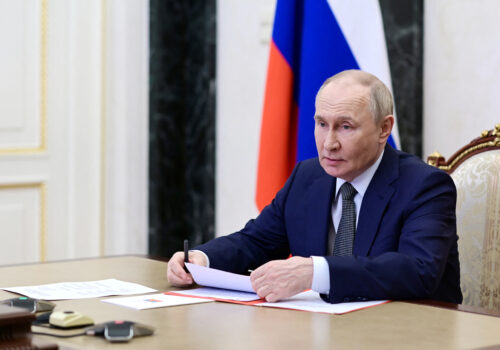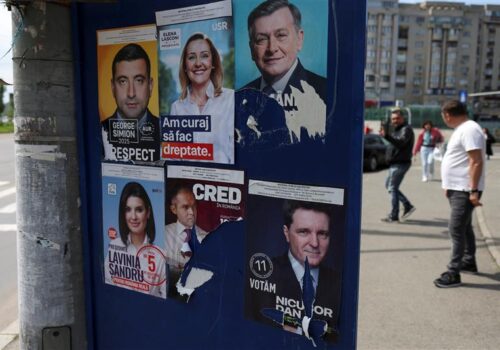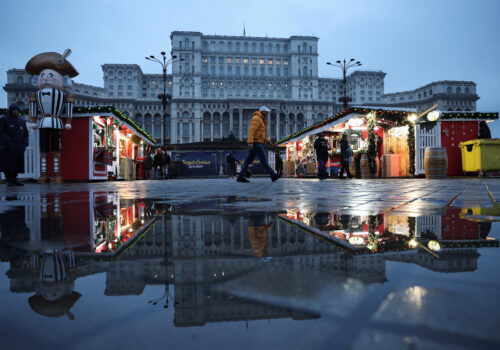Experts react: What message did Romanians send by electing Nicusor Dan?
The math adds up. On Sunday, Nicusor Dan, the mayor of Bucharest and a former mathematics professor, was elected as the next Romanian president. With more than 53 percent of the vote, the pro–European Union (EU) Dan beat out right-wing candidate George Simion. Dan’s victory comes after the Romanian Constitutional Court’s controversial decision to annul the country’s November 2024 presidential election following allegations of Russian interference. Below, our experts count up the ways that the election’s outcome matters for Romania, for EU and NATO support for Ukraine, and for the future of Eastern Europe.
Click to jump to an expert analysis:
Daniel Fried: Dan ran a pro-Europe, pro-NATO, and pro-Ukraine campaign
Victoria Olari: The implications of Dan’s win will ripple across Eastern Europe
Anca Agachi: Romanians don’t want more of the same, so how will Dan be different?
Mark Scott: It was an election fought as much online as offline
Andrei Covatariu: After the election, can Romania’s energy diplomacy bridge Brussels and Washington?
Olga Khakova: Energy policy can help build the coalition and strengthen the country
Dan ran a pro-Europe, pro-NATO, and pro-Ukraine campaign
There are two lessons to take from Romania’s presidential elections. First, Romanians seemed turned off by the establishment parties that have traded off running the government for decades. The candidate of the ruling coalition didn’t make it past the first round; and Dan and Simion were both seen, Romanians tell me, as alternatives to the ruling coalition. Second, despite predictions (or fears), the preference for an outsider didn’t translate into a preference for a nationalist or anti-EU firebrand, which is how Simion ran his campaign. Dan, a mathematician by training, ran a campaign that was pro-Europe, pro-NATO, and pro-Ukraine.
Simion appeared to enjoy support from Russia, and plenty of stories are circulating of Russian information ops in his favor. He had maintained distance from Russian President Vladimir Putin (wise in Russo-skeptic Romania) and instead courted the Make America Great Again (MAGA) movement in the United States, even visiting the United States during the campaign. But this did not translate into enough support at home.
Dan’s win is decisive, but it alone will not overcome the divisions in Romanian society. Romanians have voted for Europe and democracy, not nationalism, but they also seem to want change in the form of better governance. Dan will have a mandate but a big job ahead.
—Daniel Fried is the Weiser Family distinguished fellow at the Atlantic Council and a former US ambassador to Poland.
The implications of Dan’s win will ripple across Eastern Europe
Romania’s presidential runoff turned into an intense race with significant stakes for the nation and the wider region. Dan won, an outcome expected mainly given the high voter turnout, offering him a strong democratic mandate.
From the early hours of election day, Simion’s ultra-nationalist camp signaled that they would not accept a loss. They took to social media with accusations of fraud and amplified fake news stories that mimicked legitimate outlets and falsely declared Simion the winner. Simion told his supporters not to trust the exit polls, claiming that political elites had manipulated the results behind the scenes. His team also accused foreign actors of interference, notably targeting Moldova’s president, Maia Sandu, for allegedly mobilizing Romanian voters in Moldova. This followed an unprecedented voter turnout there in the second round, partly spurred by Simion’s hostile rhetoric toward Moldova. The nationalist camp further alleged meddling by France, specifically accusing President Emmanuel Macron of election interference.
Despite these efforts, the election results left little room for dispute. Dan secured a mandate from Romanians. Simion conceded early Monday morning, marking the end of a tense and polarized campaign.
This election isn’t just about Romania. It’s a big deal for the region, too. A win for Dan will likely lock in Romania’s commitment to the EU and NATO, a vital move as Russia’s war in Ukraine continues to unsettle the region. This is critical, as Romania’s strategic position strengthens regional security and support for Kyiv. Additionally, it will likely bolster Moldova’s EU integration efforts under Sandu, fostering closer Romania-Moldova ties and countering Russian influence. On the other hand, a Simion victory would have likely emboldened far-right movements across Europe, disrupted regional unity, and undermined support for Ukraine, which Simion openly opposed.
Even with all the divisions, Romanian voters sent a loud message: they reject the old political elite. Both Dan and Simion positioned themselves as anti-system challengers, capitalizing on widespread frustration with corruption and governance failures. This call for change is real, and it’s going to continue to shape Romania’s future.
—Victoria Olari is a research associate for Moldova at the Atlantic Council’s Digital Forensic Research Lab (DFRLab).
Romanians don’t want more of the same, so how will Dan be different?
“Hope and patience.” This is what Dan, the now president-elect of Romania, asked for in his speech when the first exit polls were released.
Patience because his mandate will be an incredibly difficult one. Immediately, he will have to choose a prime minister and help establish a pro-European political coalition in the Romanian Parliament, one third of which is made up of far-right parties. He will need to help build trust in an economy that has the EU’s highest budget deficit compared to gross domestic product. And he will need to lead the country’s foreign policy at a time when the regional context for Romania has never been more dangerous given Russia’s continued war in Ukraine. In the long term, Dan will have to face down the unaddressed root causes of discontent that gave oxygen to far-right parties in the first place and brought Romania to the brink of disaster. The country is plagued by poverty, inequality, a failing public health system, corruption, and inefficient, unresponsive, and distrusted state institutions, as well as a forgotten diaspora. He will have to “rebuild a one Romania” together with a divided population.
But Dan was also right to ask for hope. In the election result Sunday, Romania decided it cannot go back, and Romanians have firmly made the choice to remain anchored in the Western, transatlantic community. Despite external pressures, disinformation campaigns, suspicions of Russian interference, and fears of a contested election result, Romanians made it clear that they are European. But the same voters who turned out in massive numbers for two anti-system candidates also made it clear that more of the same in Romanian politics is simply not acceptable. This is the hope and the opportunity Romania is facing—starting now.
—Anca Agachi is a nonresident fellow with Transatlantic Security Initiative in the Atlantic Council’s Scowcroft Center for Strategy and Security. She currently serves as a defense policy analyst at the RAND Corporation, where she focuses on international security and defense issues.
It was an election fought as much online as offline
Faced with a barrage of false online information, potential foreign interference, and opaque practices by social media companies, Romania’s second-round presidential election held up to scrutiny—but only just. In the hours before Dan was elected, Simion took to X to proclaim himself as Romania’s new president, only to backtrack on that claim when the official tally gave Dan the final victory.
Pavel Durov, the chief executive of Telegram, the popular messaging service, also took to his platform and other social networks to accuse “a Western European government” of urging Telegram to “silence conservative voices in Romania.” The Russian tech boss subsequently named that country as France, though Paris denied any potential interference in the Eastern European country’s election.
More than any other recent European election, Romania’s vote has been riddled with potential digital attacks on local democratic institutions, including scores of cyberattacks that the country’s security forces suggested may have come from Russia. In response, Romanian officials and those from the European Commission have criticized social media companies for not doing enough to combat malign actors, both in and outside of the country.
Yet even hours after Dan was officially named as Romania’s next president, little, if any, evidence about the role these global platforms played in promoting election-related falsehoods has been made public. Local voters remain mostly in the dark about how social media—and potential bad actors—may have targeted them in this weekend’s election. That has left more questions than answers as policymakers, tech giants, and the public try to unpack how Dan successfully saw off Simion in an election that was fought as much online as offline.
—Mark Scott is senior resident fellow at the DFRLab’s Democracy + Tech Initiative within the Atlantic Council Technology Programs.
After the election, can Romania’s energy diplomacy bridge Brussels and Washington?
Romania avoided a political shock this weekend as pro-European candidate Dan defeated right-wing populist Simion. The result reassures Romania’s continued commitment to EU and transatlantic partnerships. Yet, after months of political turbulence and voter polarization, restoring macroeconomic stability now depends on forming a new government—no easy feat despite a pro-European majority in Romania’s Parliament.
The election outcome has implications for Romania’s strategic energy direction, too, even though energy and climate policy were not prominently featured in the campaign debates. Dan has pledged to keep Romania on its path of regional energy relevance, proven over the past few years, and to enhance the existing cooperation with the United States and the EU. His platform includes proposals to create a national energy champion, reduce Romania’s energy dependencies on authoritarian regimes, support strategic investment (including in data centers), and deepen ties with Moldova and Ukraine. His strong backing for EU enlargement further strengthens Romania’s geopolitical and energy role in Central and Eastern Europe (CEE).
At the same time, Romania—like other CEE states—faces a growing tension between the EU’s accelerated decarbonization push and the United States’ emphasis on “energy freedom,” as recently articulated by US Energy Secretary Chris Wright at the Three Seas Business Forum in Warsaw. This divergence presents both challenges and opportunities. The Romanian president can play a key role in expanding the win-set between Brussels and Washington through enhanced energy diplomacy—advancing nuclear partnerships (notably small modular nuclear reactors with US support), Black Sea gas development, cross-border infrastructure with Ukraine and Moldova, and clean generation scale-up. Romania also has the potential to become a clean technology manufacturing destination, supporting both EU goals and transatlantic alignment in a shifting geopolitical landscape.
By advancing projects that resonate in both Brussels and Washington, Romania can amplify its geopolitical weight in the energy space.
—Andrei Covatariu is a nonresident senior fellow with the Atlantic Council’s Global Energy Center.
Energy policy can help build the coalition and strengthen the country
This anti-establishment, anti-corruption vote presents a historic opportunity for the new Romanian leadership to use this mandate to build on previous positive energy reforms. The next Romanian government has a chance to engage with the population to forge a secure, resilient, and diversified energy strategy that can attract new deals and investments in the energy sector.
However, the close election results showcase that national concerns such as energy prices, reliability, and industrial competitiveness helped drive a significant percentage of voters to support the candidate with a nationalistic platform. The good news is that Romania can prioritize domestic issues through stronger partnerships and deeper regional integration: developing Black Sea resources, integrating electricity and gas interconnections with neighboring countries, and making progress on nuclear agreements with countries like the United States.
Romania has led on diversification from Russian energy sources and support for Ukraine and Moldova’s energy security. The new coalition can lead by example in fortifying the region from backsliding into Russian natural gas dependence, as seen in the growing Russian liquefied natural gas shipments to the EU.
Moreover, a strong energy agenda could also be a unifying platform for building the ruling coalition.
—Olga Khakova is the deputy director for European energy security at the Atlantic Council’s Global Energy Center.
Further reading
Fri, May 16, 2025
To achieve his goal of a durable peace, Trump must turn up the pressure on Putin
New Atlanticist By John E. Herbst
The Trump administration can only achieve a lasting peace in Ukraine if it makes clear that there will be consequences for Russia’s unwillingness to compromise.
Wed, May 7, 2025
Your primer on the Romanian presidential election
Eye on Europe's elections By
Ahead of the second round on May 18, our experts are breaking down the race and its potential impacts on Romania’s foreign policy.
Mon, Dec 16, 2024
Dispatch from Bucharest: Why has Romanian politics suddenly gone sideways?
New Atlanticist By Daniel Fried
Twin shocks—Călin Georgescu’s political rise and the annulment of the November 24 presidential election—have shaken the hitherto complacent centrists in Romania.
Image: Presidential candidate Nicusor Dan speaks to the media after polls close for the second round of the country's presidential election redo in Bucharest, Romania, on May 18, 2025. (Photo by Alex Nicodim/NurPhoto)



